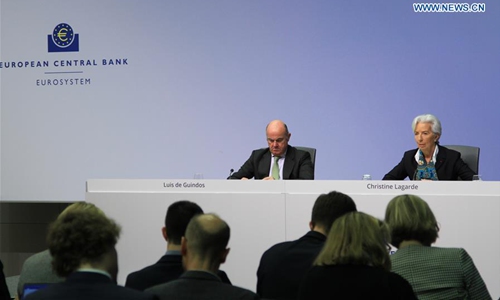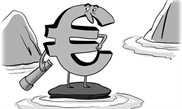
European Central Bank (ECB) President Christine Lagarde (R) and Vice-President Luis de Guindos attend a press conference at the ECB headquarters in Frankfurt, Germany, Dec. 12, 2019. . The European Central Bank on Thursday decided that the key interest rates for the euro area will remain unchanged.Photo: Xinhua
The European Central Bank (ECB) on Thursday decided that the key interest rates for the eurozone will remain unchanged. ECB President Christine Lagarde said she expected a strategy review to be completed by the end of next year.
The eurozone base interest rate will remain at 0.00 percent, and the marginal lending rate and deposit rate at 0.25 percent and minus 0.50 percent, respectively.
The ECB Governing Council reiterated that it expects the rates to remain at their present or lower levels until it has seen the inflation outlook robustly converge to a level sufficiently close to, but below, two percent within its projection horizon, and such convergence has been consistently reflected in underlying inflation dynamics.
At a press conference, Lagarde announced the ECB staff's latest macroeconomic projections for the eurozone, which foresee an annual real gross domestic product (GDP) increase of 1.2 percent in 2019, 1.1 percent in 2020 and 1.4 percent in both 2021 and 2022.
This is the first 2022 growth forecast provided by the ECB and the outlook for real GDP growth for 2020 has been revised downward slightly compared with the September projections.
Lagarde, who took office as the new ECB chief on Nov. 1, backed the comprehensive policy package that the European central bank rolled out in September, saying it provides a substantial monetary stimulus that ensures favorable financing conditions for all sectors of the economy.
Looking ahead, she said the risks surrounding the eurozone's growth outlook, mainly concerning geopolitical factors, rising protectionism and vulnerabilities in emerging markets, remain "tilted to the downside" but have become "somewhat less pronounced."
The ECB projected inflation to be at 1.2 percent in 2019, 1.1 percent in 2020, 1.4 percent in 2021 and 1.6 percent in 2022, with slight revisions from the previous version mainly driven by expected changes in energy prices.
In particular, Lagarde noted that although eurozone inflation for the entire year of 2022 is forecast at 1.6 percent, the fourth quarter forecast is 1.7 percent, meaning it is slightly increasing throughout 2022, which she considered "directionally good" but not yet the aim of the ECB.
Although the ECB's policy decisions made no mention of the strategy review, Lagarde did provide some details during the press conference, hoping to get the review started in the course of January and completed by the end of 2020.
She said the strategy review will involve consulting members of the European Parliament, the academic community and also civil society representatives.
The review, the first since 2003 for the ECB, will be comprehensive and "leave no stone unturned," including addressing social changes, such as technological development, climate change and inequality in the economy in relation to the ECB's mission as a central bank and how it could better deliver its mandate, according to Lagarde.
Lagarde also said that on the issue of cryptocurrencies, the ECB would "better be ahead of the curve" so that it could respond to existing demand.
The ECB's policy decisions came just after the US Federal Reserve decided to hold rates steady on Wednesday.
Marcel Fratzscher, president of the Berlin-based DIW research institute, said the ECB has fallen short of its inflation objective and clearly signaled that it will stick to its monetary policy stance for a longer period of time.
Fratzscher said he expected the ECB key interest rates to stay at current record low levels and rise in two to three years at the earliest, noting that the European economy is "still in an exceptionally difficult situation" and the economic outlook for 2020 and 2021 remains "enormously uncertain."


